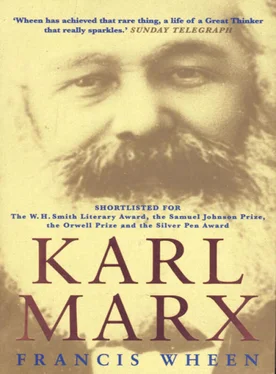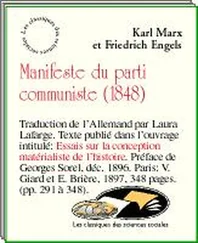It’s hard to imagine anyone less likely to appeal to Marx than this vain utopian dreamer, whose political programme was summarised in a toe-curling preface to his book Guarantees of Harmony and Freedom : ‘We wish to be free as the birds in the sky; we wish to dart through life like them, carefree in joyful flight and sweet harmony.’ The best way of achieving lift-off, Weitling suggested, was to recruit a 40,000-strong army of convicted thieves and robbers – who, driven on by their burning grudge against private property, would bring down the mighty from their seats and usher in a new age of peace and joy. ‘Criminals are a product of the present order of society,’ he wrote, ‘and under communism they would cease to be criminals.’ In Weitling’s earthly paradise everyone would be provided with identical clothes (designed by himself, no doubt), and those who wished to wear anything else would have to earn it by working overtime. Eating would take place in communal canteens, though policy on cutlery had still to be decided. (‘These tailors are really astounding chaps,’ Engels commented after meeting some of Weitling’s followers. ‘Recently they were discussing quite seriously the question of knives and forks.’) When people reached the age of fifty they would be removed from the labour force and dispatched to a retirement colony – a sort of communist Eastbourne, though perhaps without the bowls club.
One can almost hear Marx snorting with derision at this twaddle. But he hesitated to condemn it publicly. Although he had proclaimed in 1844, with patriotic hyperbole, that ‘the German proletariat is the theoretician of the European proletariat’, the truth was that until the mid-1840s he had met very few German workers. (‘What the proletariat does we know not and indeed could hardly know,’ Engels reminded him in March 1845.) At first, therefore, his reaction to the emergence of a truly working-class thinker from his homeland was like that of Dr Johnson to the dog walking on its hind legs: it is not done well but you are surprised to find it done at all – and, consequently, you reward the performing mutt with extravagant praise. ‘ Where among the bourgeoisie– including its philosophers and learned writers – is to be found a book about the emancipation of the bourgeoisie – political emancipation – similar to Weitling’s work Guarantees of Harmony and Freedom ?’ Marx wondered. ‘It is enough to compare the petty faint-hearted mediocrity of German political literature with this vehement and brilliant literary début of the German workers, it is enough to compare these gigantic infant shoes of the proletariat with the dwarfish, worn-out political shoes of the German bourgeoisie, and one is bound to prophesy that the German Cinderella will one day have the figure of an athlete …’
The itinerant Cinderella never did go to the ball, either in glass slippers or running shoes. Though Messrs Schapper, Bauer and Moll gave Weitling a generous reception when he arrived in London in 1845, they quickly concluded that his ideas were too cranky by half. He was grievously disappointed by their unwillingness to invest in his many ingenious schemes – the creation of a new universal language, the invention of a machine for making ladies’ straw hats – and even more upset when they refused to elect him as president of their association. At the beginning of 1846 he went off to try his luck in Brussels.
‘ If I tell you what kind of life we have been leading here, you would certainly be surprised at the communists,’ Joseph Weydemeyer wrote to his fiancée in February. ‘To crown the folly, Marx, Weitling, Marx’s brother-in-law and I sat up the whole night playing. Weitling got tired first. Marx and I slept a few hours on the sofa and idled away the whole of the next day in the company of his wife and his brother-in-law in the most priceless manner. We went to a tavern early in the morning, then we went by train to Villeworde, which is a little place nearby, where we had lunch and then returned in the most cheerful mood by the last train.’ It will be noticed that Weitling, after retiring early, played no part in the morning-after amusements: his halo of sanctity made him uncongenial company, especially for bourgeois intellectuals. As Engels wrote, ‘ He was now the great man, the prophet, driven from country to country, who carried a prescription for the realisation of heaven on earth ready-made in his pocket, and who imagined that everybody was out to steal it from him.’
When Heinrich Heine met Weitling, he was outraged by ‘ the fellow’s utter lack of respect while he conversed with me. He did not remove his cap and, while I was standing before him, he remained sitting with his right knee raised by the aid of his right hand to his very chin and steadily rubbing the raised leg with his left hand just above the ankle’. Cue the old trick with the trouser leg and the prison scars; but even this left Heine unmoved. ‘I confess that I recoiled when the tailor Weitling told me about these chains. I, who had once in Münster kissed with burning lips the relics of the tailor John of Leyden – the chains he had worn, the pincers with which he had been tortured and which are preserved in the Münster City Hall – I who had made an exalted cult of the dead tailor, now felt an insurmountable aversion for this living tailor, Wilhelm Weitling, though both were apostles and martyrs in the same cause.’
Marx and Engels had a similar revulsion, especially when Weitling took to addressing them as ‘my dear young fellows’, but they did their best to conceal it, if only out of respect for his proletarian status and his long years of persecution. Early in 1846 they invited him to become a founder member of the new Communist Correspondence Committee in Brussels, whose purpose was to maintain ‘a continuous interchange of letters’ with the League of the Just and other fraternal associations in western Europe. Since the committee was the original Adam from which all the many subsequent Communist Parties were descended, it may be worth listing the eighteen founding signatories: Karl Marx, Friedrich Engels, Jenny Marx, Edgar von Westphalen, Ferdinand Freiligrath, Joseph Weydemeyer, Moses Hess, Hermann Kriege, Wilhelm Weitling, Ernst Dronke, Louis Heilberg, Georg Weerth, Sebastian Seiler, Philippe Gigot, Wilhelm Wolff, Ferdinand Wolff, Karl Wallau, Stephan Born. Like most of its twentieth-century successors this communist cell asserted its authority by purging anyone suspected of deviation from official correctness; inevitably, Weitling was picked out as the first sacrificial victim.
The occasion for his ritual humiliation was a meeting on the evening of 30 March 1846 attended by half a dozen members plus an outside observer, Pavel Annenkov, a young Russian ‘aesthetical tourist’ who had lately turned up in Brussels with a letter of introduction from one of Marx’s old Paris friends. Though not a socialist, Annenkov was fascinated by the character of his host:
Marx was the type of manwho is made up of energy, will and unshakeable conviction. He was most remarkable in his appearance. He had a shock of deep black hair and hairy hands and his coat was buttoned wrong; but he looked like a man with the right and power to demand respect, no matter how he appeared before you and no matter what he did … He always spoke in imperative words that would brook no contradiction and were made all the sharper by the almost painful impression of the tone which ran through everything he said. This tone expressed the firm conviction of his mission to dominate men’s minds and prescribe them their laws. Before me stood the embodiment of a democratic dictator.
The dapper Weitling, by contrast, looked more like a commercial traveller than a hero of the working class.
Читать дальше












